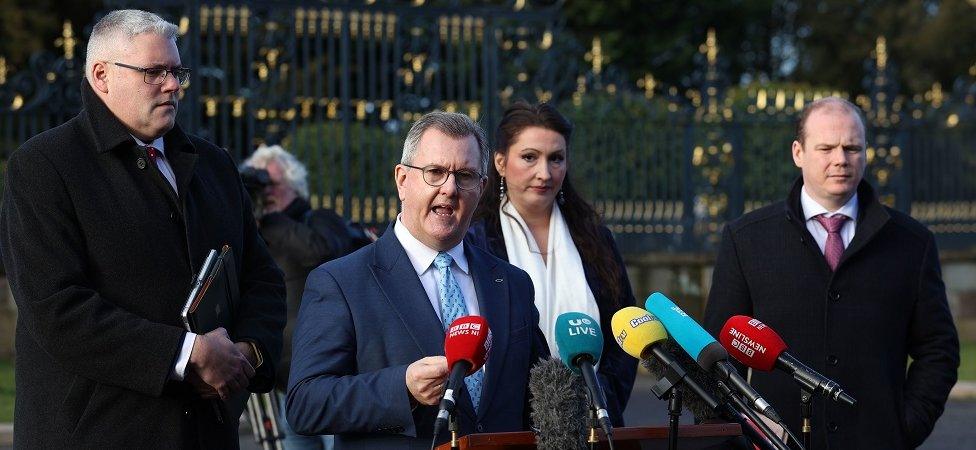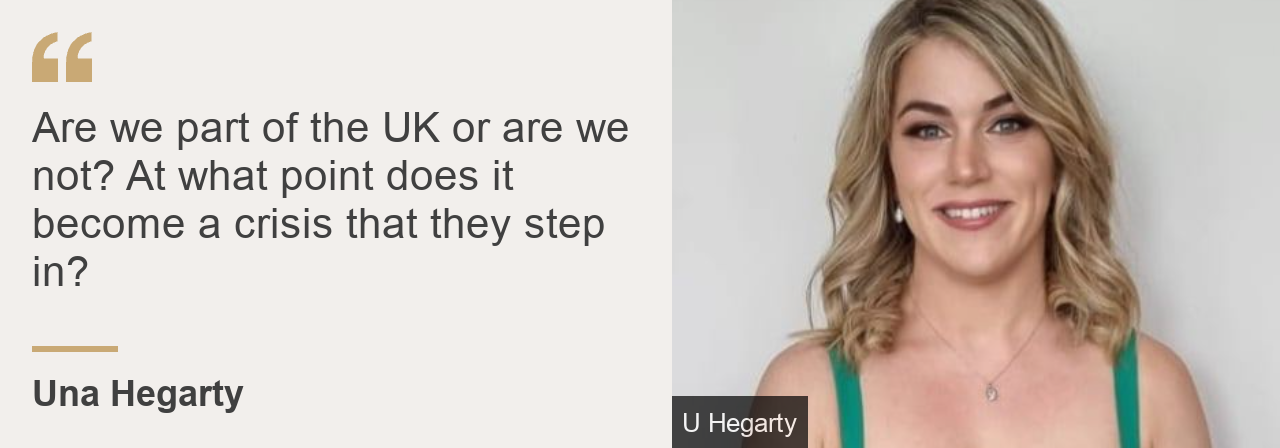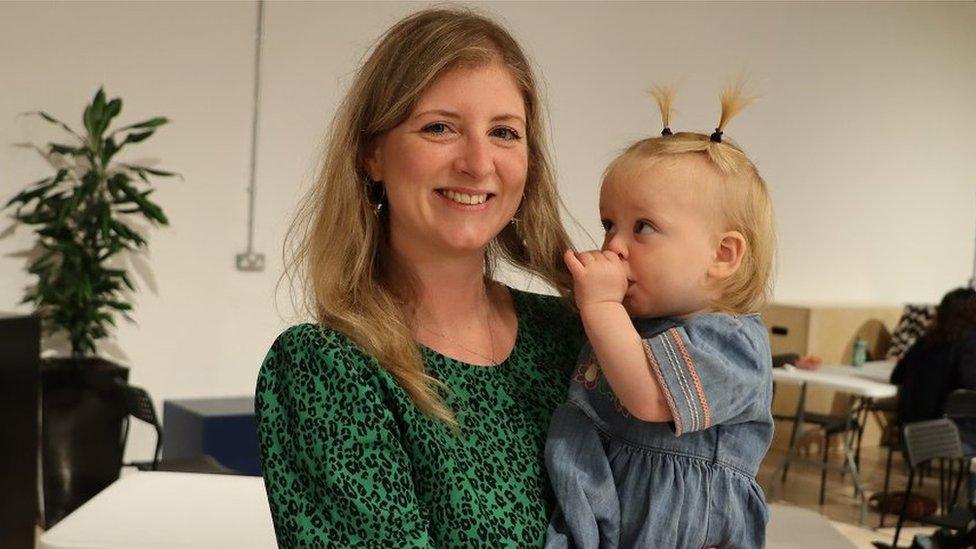NI childcare: New year, same call for government support
- Published

As parents in Northern Ireland enter a new year, childcare provision disparities deepen
Northern Ireland is being left behind by not matching childcare support on offer in England, some parents have told BBC News NI.
"Are we a part of the UK or are we not?" asks one working mother who is paying out thousands of pounds a year.
It comes as parents in England breathed an extra sigh of relief this week after applications opened for funded childcare support for two-year-olds.
But similar supports remain unavailable to families living in Northern Ireland.
That is because childcare provision remains a devolved matter, which means it is up to Stormont to decide if, and when, to invest in childcare.
But with government collapsed due to the DUP's boycott, some parents are calling for a return to power-sharing.
'Glass ceiling hasn't been smashed'
Helen McTokell, her wife and two sons live in Moira, County Down, having returned from London in 2018.
As the couple work full-time, both of their sons are in childcare at a cost of £1,410 per month after tax relief is applied.
"I work for an English company, its decently well-paid, but childcare is still an exorbitant amount of money," Ms McTokell told BBC News NI.

Helen McTokell has written to Sir Jeffrey Donaldson on childcare supports
Some mothers in Northern Ireland are returning to the workplace on a part-time basis as they cannot afford full-time childcare, as is the case for some of Ms McTokell's friends.
"From a macro point of view in terms of equality, the glass ceiling hasn't been smashed. You go to the baby classes, the mother tends to be the one who takes that hit," she explained.
"It has a massive knock-on effect not just for now, but for [female] leadership positions in Northern Ireland in 20 years time, we'll be so far behind."
'Absolutely abhorrent'
Ms McTokell said she wrote to her local MP, Democratic Unionist Party (DUP) leader Sir Jeffrey Donaldson, to discuss the need for a childcare strategy in Northern Ireland.
Sir Jeffrey responded to her letter, she said, with assurances that childcare provision is high on his party's agenda.
"It doesn't matter what plan you have, if you're not working, you can't do it," she added.
The DUP is boycotting devolved government over concerns about post-Brexit trade arrangements.
At recent talks to restore Stormont, the UK government had offered what it called a "generous package" of £3.3bn for a new executive, but the talks ended with the DUP ruling out a return before Christmas.

The DUP has been boycotting power-sharing since February 2022
"I think it's absolutely abhorrent that they're still not back to work," Ms McTokell added.
"Regardless of what side of the coin you look at, Sinn Féin did it for three years, I don't really care in regard of who it is, but I do think Westminster just needs to take control."
Crisis point
Una Hegarty from Magherafelt, County Londonderry, agrees that direct action is needed.
"I don't know why Westminster hasn't stepped in," she said. "When it comes to anything that gives you further support, you're penalised, are we part of the UK or are we not?"
Ms Hegarty has two children, aged five and three, and their monthly childcare costs can range from £600 to £900 depending on the time of year.
With a role in construction management, Ms Hegarty is able to work at home some days and has reduced her working week.

She also feels that women are being held back in the workplace due to rising childcare costs.
Ms Hegarty added it was an "absolute disgrace" that there is no executive sitting to address financial pressures in Northern Ireland.

"We can't afford another child," Una Hegarty explained
"They're obviously not having the same struggles that everyone underneath them is having with childcare, mortgages, everything, they aren't feeling the pinch," she said.
She is worried people in Northern Ireland are reaching "crisis point" and may consider relocating due to rising costs across the board.
"We'll leave a crippled economy for the children we're rearing."
'It can be really hard some days'
At the moment, working parents of three and four-year-olds in England are eligible for 30 hours of free childcare per week during term time.
From April, working parents of two-year-olds will get 15 hours per week during term time, with children from nine months included from September.
"It's not great to be honest, it just seems a bit unfair," said Jane McStay from Lurgan, County Armagh.
She has twin sons, aged two this May, and has had to reduce her working hours to 12 hours a week as she cannot afford full-time childcare.
Her mother has also reduced her working week to four days so she can babysit the twins.

"I couldn't afford to go back fulltime, my whole wage would have been going to childcare," says Jane McStay
"I miss being able to talk to adults. It drains you, it can be really hard some days," she said.
Although her work allows for flexibility, she feels as though career progression is not a possibility at the moment.
"If we had the same help available here, it would have been a whole lot better, I could have went back to work for more hours," she added.
"I have friends from England, they can't believe how much it costs here. We should have the same rights as everyone else in the UK."
'Left behind by lack of government'
The Melted Parents campaign group is calling for childcare reform in Northern Ireland.
The group's co-founder Becca Harper told BBC News NI that families in Northern Ireland have been "repeatedly left behind" by a lack of government.
"This is an economic crisis with more and more parents having to leave the workplace because childcare bills cost more than their monthly salaries," she said.
Childcare costs: The NI parents who can't afford to go to work
The Department of Education leads on the development of an Early Learning and Childcare Strategy.
A spokesperson for the department said a "range of potential actions" to address the affordability and accessibility of childcare are being developed and costed.
However, these will "require executive agreement on significant policy issues", they added.
The Northern Ireland Office (NIO) has also maintained that childcare reform is a devolved matter "for consideration by a restored Northern Ireland Executive".
"It remains the secretary of state's priority to see the return of locally elected, accountable and effective devolved government, which is the best way for Northern Ireland to be governed," an NIO spokesperson said.
Related topics
- Published13 August 2023

- Published15 March 2023

- Published6 December 2023
